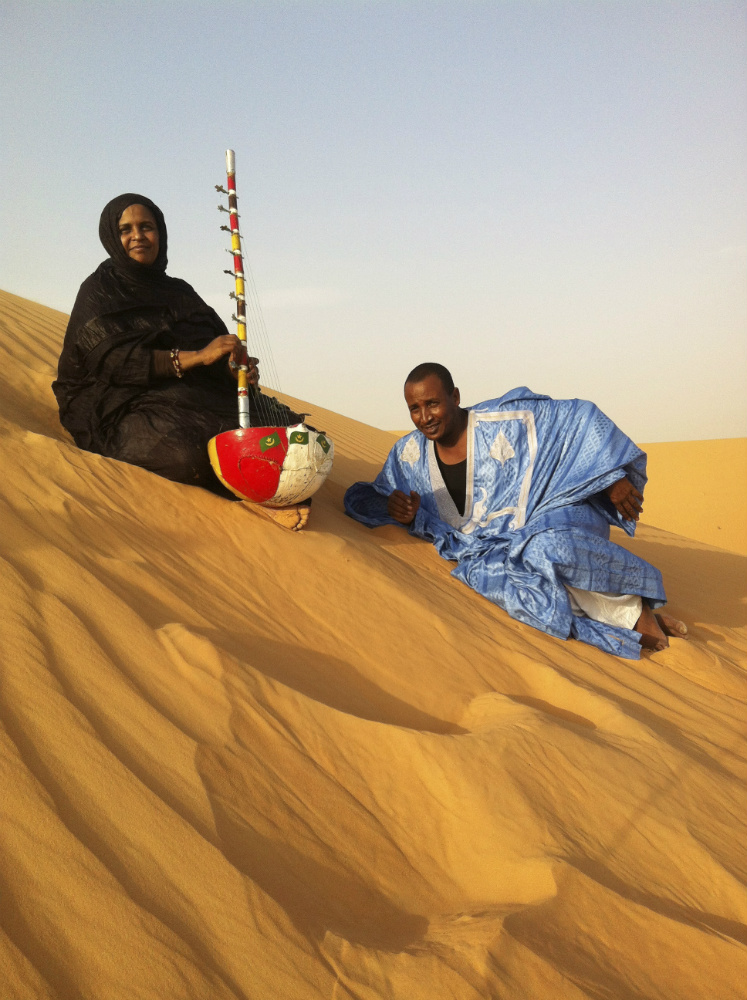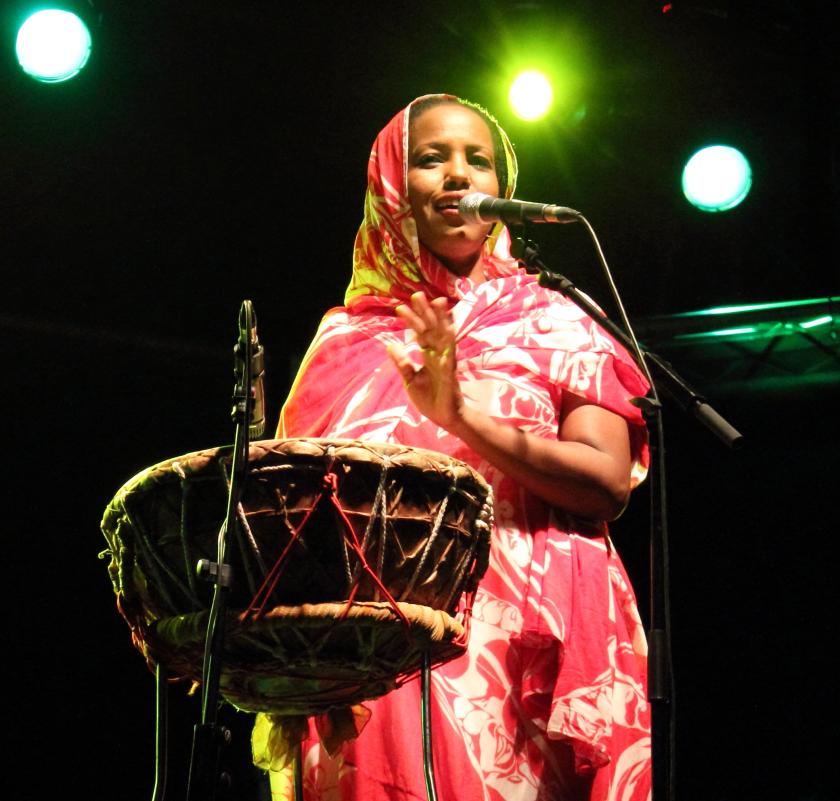Exoticisation, at an event named "Sahara Soul", was perhaps inevitable. With Tuareg jewellery and souvenirs in the foyer, there was a touristic expectation last night that these genuine desert-dwellers would bring the burning spirit of the Saharan blues along with their glinting necklaces. Indeed the first set was the diamond display of an all-star ensemble, brought together exclusively for this performance as part of the Barbican’s Transcender Festival.
The women of Malian ensemble Tartit were the first to file onto the stage, in irridescent white gowns and ornate headdresses, to be joined by members of Tamikrest, Tinariwen and Nabil Baly Othmani. As the musicians settled themselves, the microphones captured an accidentally sensuous intro of taps, pops and the faint sound of strings lightly plucked as they pulled against fabric and fingertails. Then silence fell and the distinctive coarse timbre and quartertones of the soku (West African violin) sounded, announcing the mood like a call to prayer. A male voice joined, part singing, part speaking a text in unknown dialect, while dry ice swirled in the sunset-amber glow.
This meditative musical landscape, orchestrated to slow time with its languid rubato, resembled the atmospheric intro track common to world music albums, and faded out almost as soon as the scene had been set.
Political struggle was simply a powerful selling point
Their repertoire moved from a languid ooze, with women ululating in the half-light, to the skipping groove particular to the Sahara, where Ngonis interact with hand drums and the body wants to step and sway across a straw mat. One of the more show-trained singers of Tinariwen took centre stage, flinging his limbs exuberantly to the delight of the clapping audience. In this fragmented way, songs appeared and disappeared like extracts from hours-long pieces, providing a glimpse at the different musical textures of the Sahara region, but never lingering long (or deeply) enough to truly transport the mind.
For Tartit’s leader Fadimata Walett Oumar this performance was a political platform and she took every amplified opportunity to mention Mali’s refugee camps. Her request for prayer, as she left the stage, was greeted with baffled silence.
After the interval, Robin Denselow conducted interviews with the upcoming ensemble leaders. This uncomfortable scene of vague questions, filtered arduously back and forth through an interpreter, seemed to enact that gulf of misunderstanding and loss of original intention that so often occurs when deeply-rooted cultural traditions are hurriedly re-contextualised.
 However, Noura Mint Seymali, who opened the second set with her duo partner and husband Jeiche Ould Chighaly on guitar (both pictured right), appeared to exist beyond the mistranslations. Referencing her musical heritage she begun with a religious song ‘Allah, Allah’ sung by the great Dimi Mint Abba, both evoking her late stepmother’s inflections and reinvigorating the repertoire with her own determined style.
However, Noura Mint Seymali, who opened the second set with her duo partner and husband Jeiche Ould Chighaly on guitar (both pictured right), appeared to exist beyond the mistranslations. Referencing her musical heritage she begun with a religious song ‘Allah, Allah’ sung by the great Dimi Mint Abba, both evoking her late stepmother’s inflections and reinvigorating the repertoire with her own determined style.
But her voice, deplorably low in the mix, was often lost in the room, missing the crystalline attacks that might have leant the song its sacred meaning, so that it sounded instead too strained to be sublime. Despite her evident vocal discomfort she sung with captivating rhythmic finesse, sculpting intricate melodies in intimate call-and-response with Chighaly’s rich and distinctive sound on his quartertone-fret electric guitar.
This fine music was followed by Nabil Baly Othmani - his male trio combining oud, djembe, darkbuka and vocals for a repetitive but hypnotic set of vocal motifs and rhythms evocative of gnauoa trance. Their music was like a pot left to simmer gently, then beginning to bubble with the driving tempo, just reaching boiling point before it was cut off, ready for applause.
The show concluded with a tepid set of Aziza Brahim and her band whose fusionistic sound was a tiresome, diluted broth of Arab and Hispanic influences and drum parts which entirely obscured Brahim’s hand drum rhythms. Losing focus as she sang through a self-conscious smile, her world music mulch was the unfortunate product of cultural showcasing.
There was a pragmatism and disjointedness to this programme curated by the artists’ shared record label and the music lost much of its essence when boxed up for show. At the prestigious Barbican Centre political struggle was simply a powerful selling point and even the revolutionary Tartit, who evolved from the protest music of the Sahara’s refugee camps, fell flat in this City of London concert hall.















Add comment